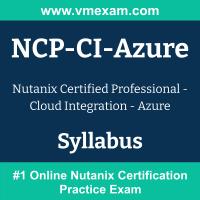 The Nutanix NCP-CI-Azure exam preparation guide is designed to provide candidates with necessary information about the Cloud Integration - Azure exam. It includes exam summary, sample questions, practice test, objectives and ways to interpret the exam objectives to enable candidates to assess the types of questions-answers that may be asked during the Nutanix Certified Professional - Cloud Integration - Azure (NCP-CI-Azure) exam.
The Nutanix NCP-CI-Azure exam preparation guide is designed to provide candidates with necessary information about the Cloud Integration - Azure exam. It includes exam summary, sample questions, practice test, objectives and ways to interpret the exam objectives to enable candidates to assess the types of questions-answers that may be asked during the Nutanix Certified Professional - Cloud Integration - Azure (NCP-CI-Azure) exam.
It is recommended for all the candidates to refer the NCP-CI-Azure objectives and sample questions provided in this preparation guide. The Nutanix Cloud Integration - Azure certification is mainly targeted to the candidates who want to build their career in Professional Level domain and demonstrate their expertise. We suggest you to use practice exam listed in this cert guide to get used to with exam environment and identify the knowledge areas where you need more work prior to taking the actual Nutanix Certified Professional - Cloud Integration - Azure exam.
Nutanix NCP-CI-Azure Exam Summary:
|
Exam Name
|
Nutanix Certified Professional - Cloud Integration - Azure |
| Exam Code | NCP-CI-Azure |
| Exam Price | $199 USD |
| Duration | 120 minutes |
| Number of Questions | 75 |
| Passing Score | 3000 on a scale of 1000-6000 |
| Recommended Training / Books | Nutanix Cloud Clusters on Azure Administration (NC2A-Azure) |
| Schedule Exam | Nutanix |
| Sample Questions | Nutanix NCP-CI-Azure Sample Questions |
| Recommended Practice | Nutanix Certified Professional - Cloud Integration - Azure (NCP-CI-Azure) Practice Test |
Nutanix Cloud Integration - Azure Syllabus:
| Section | Objectives |
|---|---|
Planning an NC2 on Azure Deployment |
|
| Prepare the Azure cloud environment |
Knowledge: - Determine the Cloud provider to use - Determine cloud region(s) to be used from the selected cloud provider - Determine the appropriate cloud Azure organization/account - Determine the node type to use |
| Subscribe to the NC2 service |
Knowledge: - Determine my.nutanix.com authentication methods, types, and organizations based on requirements - Determine NC2 organization naming convention and the associated cloud accounts - Apply applicable RBAC roles - Compare subscription plan options |
| Determine implementation requirements |
Knowledge: - Outline redundancy/resiliency requirements - Evaluate deployment use cases - Compare Nutanix compatibility matrix to requirements - Implement NC2 integrations with provider services - Determine allowed client access methods |
| Identify networking requirements |
Knowledge: - Determine on-prem connectivity to NC2 cluster hosted in the cloud provider, such as, VPN, ExpressRoute, SDWAN, and Megaport - Determine appropriate CIDR ranges needed for VNets, delegated subnets, and Flow User VM Networks, such as NAT, noNAT, and L2 stretch |
Deploying an NC2 on Azure Environment |
|
| Deploy the cloud cluster |
Knowledge: - Identify number of clusters, nodes in each cluster, and node types needed - Define deployment types - Identify Prism Central supported topologies - Describe Flow Gateway configuration - Identify management networking type |
| Configure cloud provider networking |
Knowledge: - Configure VNet resources (e.g., manual, automated) - Configure outbound public internet connectivity - Configure connectivity between environments, such as VPN, ExpressRoute, and network peering |
| Troubleshoot cluster deployment issues |
Knowledge: - Verify cloud account quota, permission, and policies, such as Allowlisting, secret expiration, and IAM - Verify NC2 portal permissions and configurations |
Configuring an NC2 on Azure Environment |
|
| Modify cloud networking security |
Knowledge - Determine access to the Cluster Management - Modify access to workloads running on the NC2 cluster |
| Configure Nutanix networking |
Knowledge - Configure Nutanix Flow networking:
|
| Troubleshoot connectivity issues |
Knowledge - Verify initial cluster connectivity - Verify User VM connectivity, for example, access to corporate locations and internet resources via network ports, security groups, ACLs, and routing |
Managing an NC2 on Azure Environment |
|
| Identify management tasks for nodes and clusters |
Knowledge - Identify cluster capacity and node types - Identify node scale-out/scale-up triggers - Describe the node management process - Define the environment upgrade process |
| Monitor cluster and cloud resource health |
Knowledge - Identify alerting options - Describe alert email configuration options - Identify syslog monitoring options, such as modules, severity levels, Azure Monitor, and Data Dog - Describe the cluster support process |
